
The Ivy League is an American collegiate athletic conference, comprising eight private research universities in the Northeastern United States. The term Ivy League is typically used outside sports to refer to the eight schools as a group of elite colleges with connotations of academic excellence, selectivity in admissions, and social elitism. Its members are Brown University, Columbia University, Cornell University, Dartmouth College, Harvard University, Princeton University, University of Pennsylvania, and Yale University. The conference headquarters are in Princeton, New Jersey.

Phillips Academy is a co-educational college-preparatory school for boarding and day students located in Andover, Massachusetts, a suburb of Boston. The academy enrolls approximately 1,150 students in grades 9 through 12, including postgraduate students. It is part of the Eight Schools Association and the Ten Schools Admissions Organization.

Harvard College is the undergraduate college of Harvard University, a private Ivy League research university in Cambridge, Massachusetts, United States. Part of the Faculty of Arts and Sciences, Harvard College is Harvard University's traditional undergraduate program, offering AB and SB degrees. It is highly selective, with fewer than four percent of applicants being offered admission as of 2022.

The Harvard Crimson is the student newspaper of Harvard University and was founded in 1873. Run entirely by Harvard College undergraduates, it served for many years as the only daily newspaper in Cambridge, Massachusetts.

Groton School is a private college-preparatory day and boarding school located in Groton, Massachusetts. It is affiliated with the Episcopalian tradition.

St. Paul's School is a college-preparatory, coeducational boarding school in Concord, New Hampshire, affiliated with the Episcopal Church. The school's 2,000-acre (8.1 km2), or 3.125 square mile, campus serves 540 students, who come from 37 states and 28 countries.
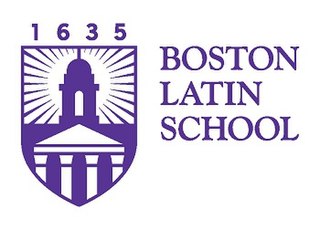
The Boston Latin School is a public exam school in Boston, Massachusetts. It was established on April 23, 1635, making it both the oldest public school in colonial-era British America and the oldest existing school in the United States. The school's admission policies and demographics have been controversial.
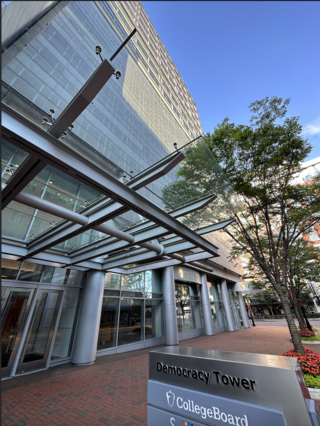
The College Board is an American not-for-profit organization that was formed in December 1899 as the College Entrance Examination Board (CEEB) to expand access to higher education. While the College Board is not an association of colleges, it runs a membership association of institutions, including over 6,000 schools, colleges, universities, and other educational organizations.
Neil Leon Rudenstine is an American scholar, educator, and administrator. He served as president of Harvard University from 1991 to 2001.
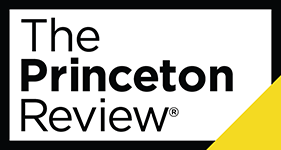
The Princeton Review is an education services company providing tutoring, test preparation and admission resources for students. It was founded in 1981, and since that time has worked with over 400 million students. Services are delivered by 4,000+ tutors and teachers in the United States, Canada and international offices in 21 countries.; online resources; more than 150 print and digital books published by Penguin Random House; and dozens of categories of school rankings. The Princeton Review's affiliate division, Tutor.com, provides online tutoring services. The Princeton Review is headquartered in New York City and is privately held. The Princeton Review is not associated with Princeton University.
Early decision (ED) or early acceptance is a type of early admission used in college admissions in the United States for admitting freshmen to undergraduate programs. It is used to indicate to the university or college that the candidate considers that institution to be their top choice through a binding commitment to enroll. Applying early decision brings a greater statistical chance of being accepted.
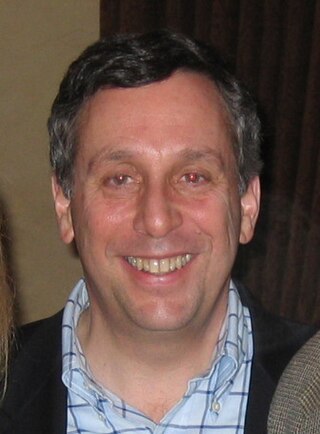
Lawrence Seldon Bacow is an American economist and retired university administrator. Bacow served as the 12th president of Tufts University from 2001 to 2011 and as the 29th president of Harvard University from 2018 to 2023. Before that, he was the Hauser leader-in-residence at the Center for Public Leadership at Harvard Kennedy School.

Legacy preference or legacy admission is a preference given by an institution or organization to certain applicants on the basis of their familial relationship to alumni of that institution. It is most controversial in college admissions, where students so admitted are referred to as legacies or legacy students. The practice is particularly widespread in the college admissions in the United States; almost three-quarters of research universities and nearly all liberal arts colleges grant legacy preferences in admissions.

College admissions in the United States refers to the process of applying for entrance to institutions of higher education for undergraduate study at one of the nation's colleges or universities. For those who intend to attend college immediately after high school, the college search usually begins in the eleventh grade with most activity taking place during the twelfth grade. Applications to many schools are due in October or November of senior year for Early Decision or Early Action, or in December or January of their senior year for Regular Decision, though the timeline may vary depending on the universities, some having an earlier deadline due to the fact that the admissions process may weigh in more on transcripts. Students at top high schools may often begin the process during their tenth grade or earlier. There are considerable numbers of students who transfer from one college to another, as well as adults older than high school age who apply to college.

How Opal Mehta Got Kissed, Got Wild, and Got a Life is a young adult novel by Kaavya Viswanathan, written just after she graduated from high school. Its 2006 debut was highly publicized while she was enrolled at Harvard University, but the book was withdrawn after it was discovered that portions had been plagiarized from several sources, including the works of Salman Rushdie and Meg Cabot. Viswanathan immediately apologized and stated that similarities were "completely unintentional and unconscious." All shelf copies of Opal Mehta were ultimately recalled and destroyed by the publisher, and Viswanathan's contract for a second book was canceled.
IvyWise is a for-profit New York-based firm of educational consultants that assists students pursuing admission to college. IvyWise counselors also work with students applying to nursery school, elementary school, high school/boarding school, and graduate or professional schools.

Harvard University is a private Ivy League research university in Cambridge, Massachusetts. Founded in 1636 as Harvard College and named for its first benefactor, Puritan clergyman John Harvard, it is the oldest institution of higher learning in the United States. Its influence, wealth, and rankings have made it one of the most prestigious universities in the world.
College Possible is a nonprofit AmeriCorps organization making college admission and success possible for low-income students in the United States through an intensive curriculum of coaching and support. Its model uses recent college graduates serving an AmeriCorps term of service as near-peer mentors for students lacking the social resources to successfully enroll in and graduate from college. Headquartered in Saint Paul, Minnesota, the organization serves students in all 50 states with offices located in the Minneapolis-Saint Paul metro area, Chicago, Milwaukee, Omaha, Portland, Philadelphia and Seattle.

The Harvard Crimson men's basketball program represents intercollegiate men's basketball at Harvard University. The team currently competes in the Ivy League in Division I of the National Collegiate Athletic Association (NCAA) and plays home games at the Lavietes Pavilion in Boston, Massachusetts. The Crimson are currently coached by Tommy Amaker.
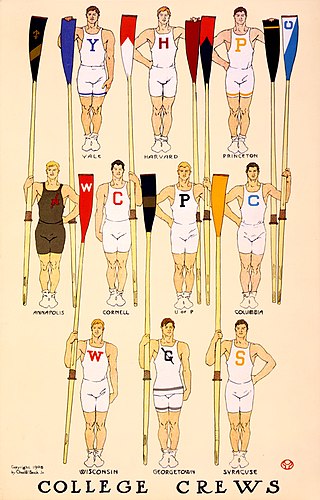
The Big Three, also known as HYP, is a historical term used in the United States to refer to Harvard University, Yale University, and Princeton University. The phrase Big Three originated in the 1880s, when these three colleges dominated college football. In 1906, these schools formed a sports compact that formalized a three-way football competition which began in 1878. This early agreement predated the Ivy League by nearly a century. Today, the term is used to refer to the comparable levels of prestige, tradition, elitism, and academic and intellectual superiority affiliated with the schools. The rivalry remains intense today, though the three schools are no longer national football powerhouses, and schools continue to refer to their intercollegiate competitions as "Big Three" or "Harvard-Yale-Princeton" meets.















